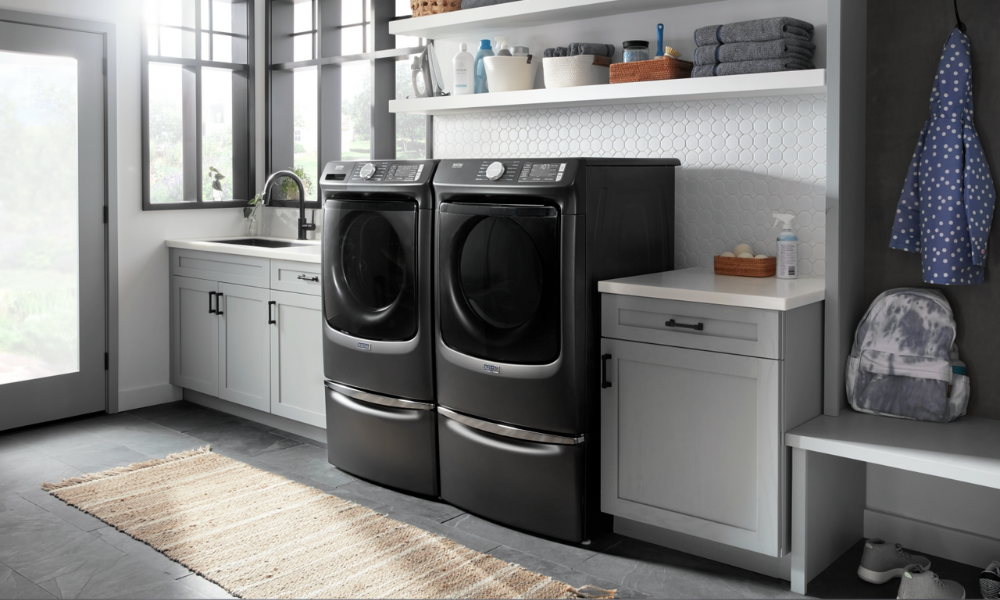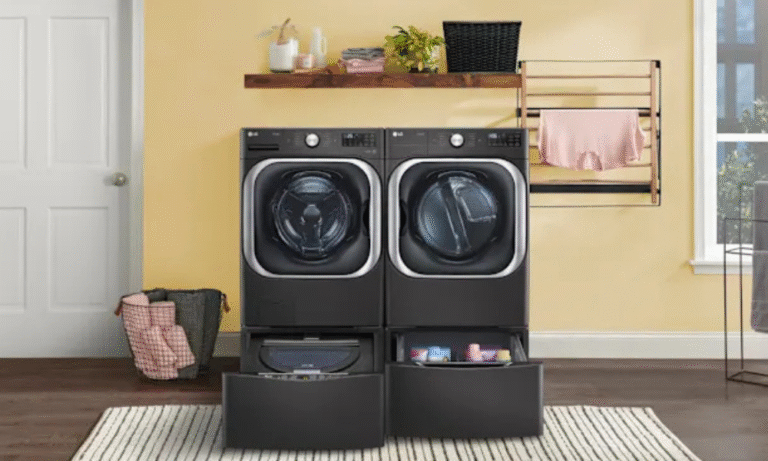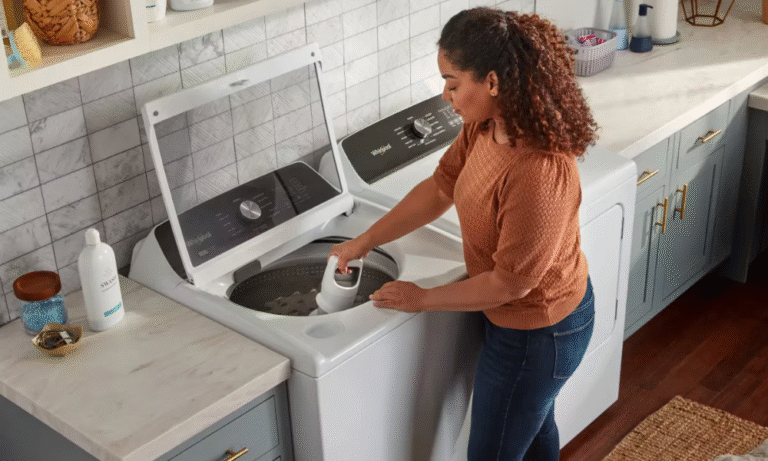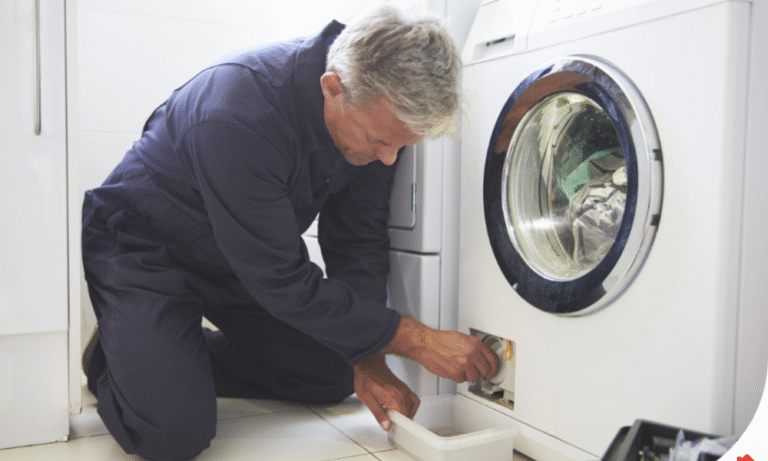Estimated reading time: 19 minutes
Last updated on August 21st, 2025 at 06:16 am
The importance of energy-efficient appliances cannot be stressed in the modern world when environmental preservation and energy efficiency are becoming more and more important. The washing machine is one such device that is essential for energy conservation and minimizing environmental impact. The significance of energy-efficient washing machines is discussed in this article, along with some of their important characteristics, advantages, and considerations.
What Is Washing Machine Energy Efficiency
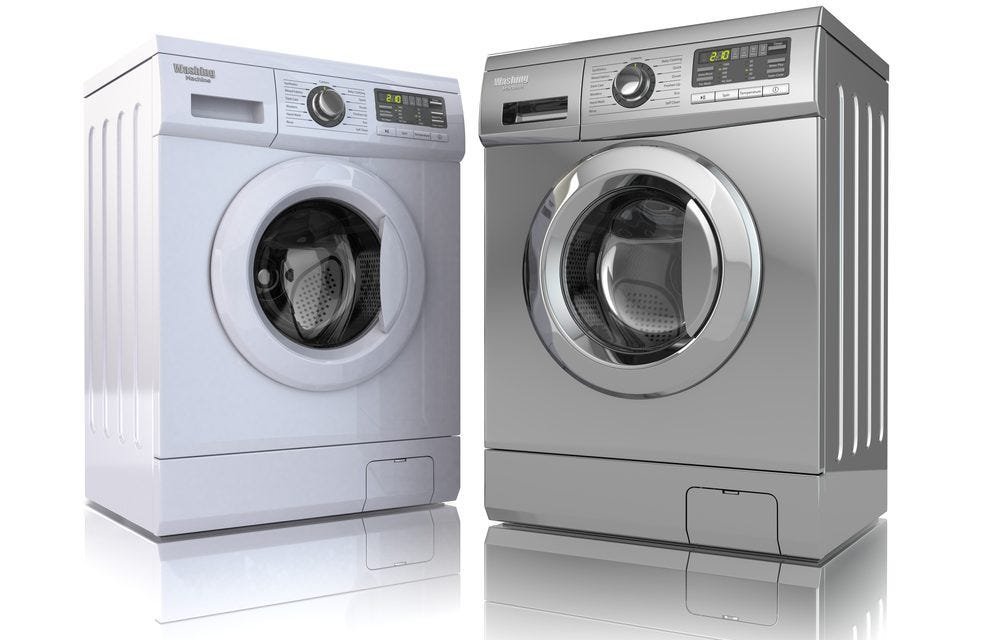
Photo Source: freepik
The amount of energy used by a washing machine to carry out its cleaning duties is referred to as its energy efficiency. It gauges how efficiently the washer uses energy while generating the least amount of trash. Energy-efficient washing machines are made to use less water and power than standard models, which lowers energy usage and utility costs.
Energy-efficient washing machines typically incorporate several features and technologies to optimize their energy usage:
- High-efficiency motors: These motors are created to use less energy while still supplying the machine with the necessary power. They spend less energy because they are more effective and generate less heat.
- Advanced water management: Modern energy-saving washing machines frequently make use of sensors and other technology to monitor and modify water use in accordance with the size of the load. As a result, less water and energy are wasted because just the necessary amount of water is used.
- Better insulation: To prevent heat loss during the drying and washing cycles, energy-efficient versions may feature improved insulation. This keeps the machine inside at the ideal temperature, using less energy to heat the water and dry the clothing.
- Effective cleaning and efficient wash and spin cycles: electricity-efficient washing machines have wash and spin cycles that are calibrated to provide thorough cleaning while consuming the least amount of electricity. These cycles could have faster spins for effective water extraction, shorter wash durations, and cooler water temperatures.
- Load sensing and auto-adjustment: A lot of energy-efficient machines include load-detecting features that can determine how much laundry is being done at once. When necessary, the machine subsequently modifies water levels, cycle length, and energy consumption accordingly.
- Energy labels and certifications: Energy-efficient washing machines are often labeled with energy efficiency ratings or certifications, such as the Energy Star label. These labels inform customers of the machine’s energy usage and efficiency in comparison to other models.
Reduced energy costs, fewer environmental effects, and the possibility to be eligible for energy efficiency rebates or incentives are just a few advantages of choosing an energy-efficient washing machine. It is advised to seek washing machine models with good energy efficiency ratings and features that fit your requirements and environmental goals.
How Energy Efficiency Relates to Washing Machines
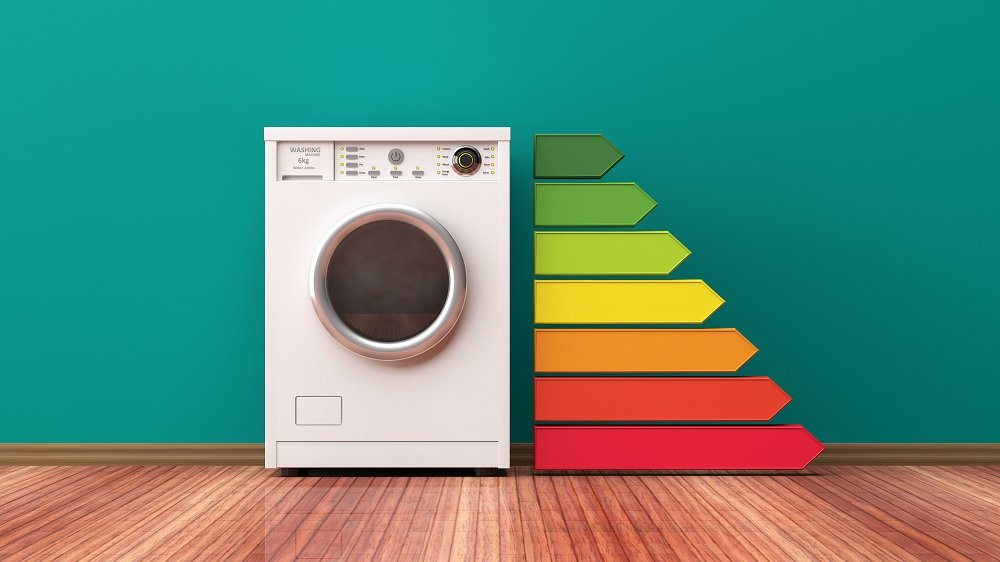
Photo Source: 123rf
The capacity of washing machines to use the least amount of energy possible while yet performing well in terms of cleaning is referred to as energy efficiency. Modern engineering and design elements are used in energy-efficient washing machines to maximize energy use throughout the washing operation.
These appliances can use less energy and spend less money on utilities since they include features including high-efficiency motors, load sensing capabilities, optimized wash and spin cycles, and enhanced insulation. Selecting an energy-efficient washing machine delivers long-term savings for customers through lower energy costs, as well as environmental advantages by lowering greenhouse gas emissions.
Advantages of energy-saving washing machines
Numerous advantages of energy-efficient washing machines include:
- Lessened energy consumption: Models that are energy-efficient are built to utilize less power, which lowers energy consumption. This not only aids in lowering your carbon footprint but also gradually decreases your utility costs.
- Cost savings: Energy-efficient washing machines can result in considerable cost savings on your monthly energy bills due to decreased energy usage. The long-term savings you’ll see will frequently cover the initial expenditure in an energy-efficient model.
- Water conservation: Many water-saving washing machines are made to consume less water with each load in addition to being energy-efficient. These devices assist save water resources by optimizing water use and using technologies like load sensing, which benefits the environment and lowers your water bill.
- Enhanced cleaning performance: Energy-efficient washing machines are engineered to deliver effective cleaning while using less energy and water. They frequently come along with cutting-edge technology and improved wash cycles that guarantee complete cleaning without sacrificing performance.
- Extended lifespan of clothes: The gentle and efficient washing action of energy-efficient machines helps protect your clothes from excessive wear and tear. These devices can increase the longevity of your clothing by lessening the stress placed on the fabric.
- Quieter operation: Energy-efficient versions sometimes include noise-cancelling features such enhanced motor insulation and vibration control. As a consequence, the process is quieter, enabling a more tranquil washing experience.
- Environmental advantages: electricity-efficient washing machines support environmental sustainability by using less electricity and water. They foster a better future by lowering greenhouse gas emissions related to the production of power and by conserving scarce water resources.
- Incentives and certifications: Purchasing an energy-efficient washing machine may make you eligible for rebates, incentives, or tax credits offered by utility companies or government programs. Additionally, energy-saving appliances frequently have certifications like the Energy Star mark, which attests to their efficiency.
You may gain the advantages of reduced energy consumption, financial savings, environmental sustainability, and increased cleaning performance by selecting an energy-efficient washing machine. It benefits your family as well as the environment.
Energy-saving washer features
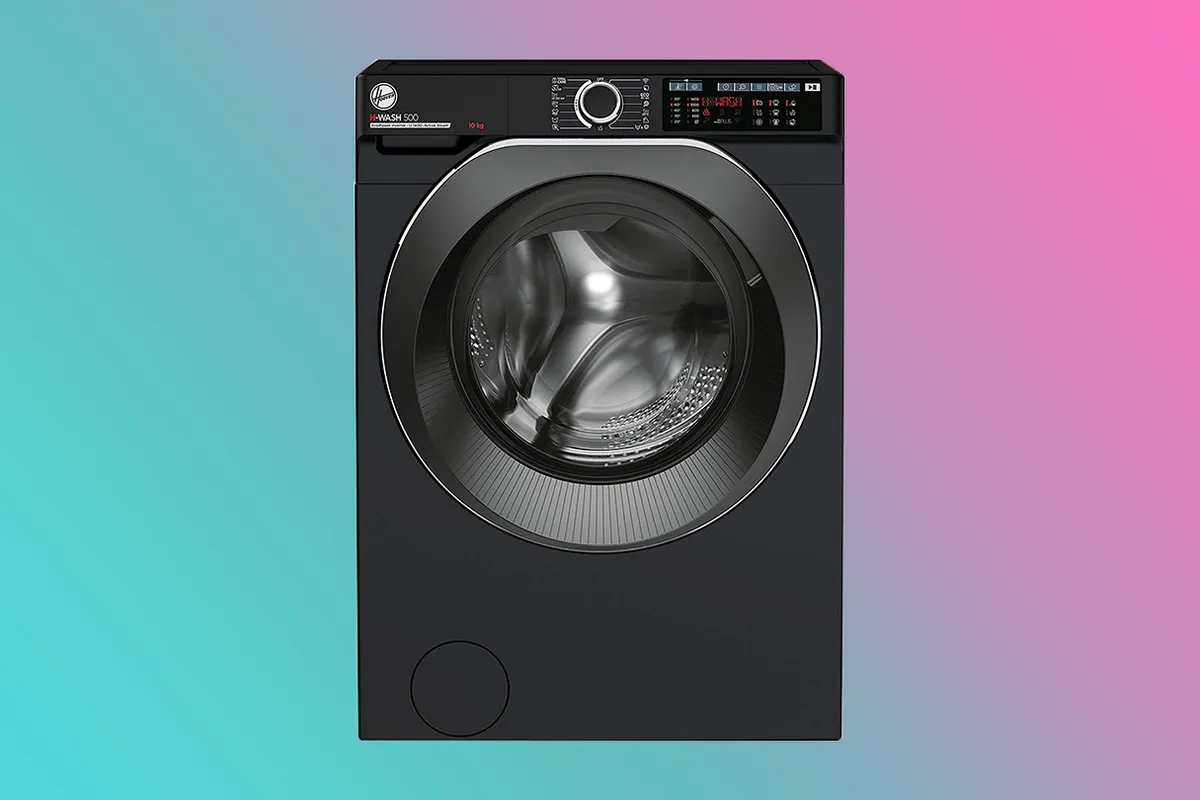
Photo Source: yourhomestyle
A number of essential elements are included in washing machines that are energy-efficient, which improves their performance and lowers their energy usage. Here are some typical characteristics to look for:
- Energy Star Certification: Energy-efficient washing machines frequently display the Energy Star logo, signifying that they meet or exceed Environmental Protection Agency (EPA) energy efficiency standards. This certification guarantees that the device uses less energy and functions well.
- High-Efficiency Motor: Models equipped with high-efficiency motors consume less energy while maintaining excellent washing performance. These motors are designed to use less energy and operate at lower temperatures, effectively reducing overall energy consumption.
- Load Sensing Technology: This feature is present in many energy-efficient washing machines. The size of the laundry load is detected by this function, which then modifies the water pressure and cycle times appropriately. It avoids needless resource waste by employing the correct quantity of water and energy required for each load.
- Various Washing Cycles and Options: Models that use less energy include a variety of wash settings and cycles designed for various fabric kinds and levels of dirtiness. Based on your laundry demands, these choices let you adjust the wash settings and use less energy and water.
- Temperature and Water Control: Energy-efficient machines often provide temperature and water control options, allowing you to select lower temperature settings for washing and rinsing cycles. This reduces the need for hot water, which saves electricity.
- Effective Water Extraction: Energy-efficient washers frequently include fast spin cycles that efficiently remove water from clothing. The drying time is shortened during the spin cycle, which saves energy whether using a dryer or letting the clothing air dry.
- Better Vibration and Insulation management: Energy-efficient versions may have devices for better vibration and insulation management. These make washing operations quieter and more energy-efficient by minimizing noise and vibrations during operation and reducing heat loss.
- Delay Start and Time Remaining Display: A few environmentally friendly washing machines provide functions like delay start and time remaining display. These enable you to maximize energy use by taking advantage of off-peak electricity rates or scheduling your laundry cycles more effectively.
You may choose an energy-efficient washing machine that maximizes energy savings without sacrificing cleaning effectiveness by taking into account these important factors when making your selection.
Comparing Energy Efficiency Ratings
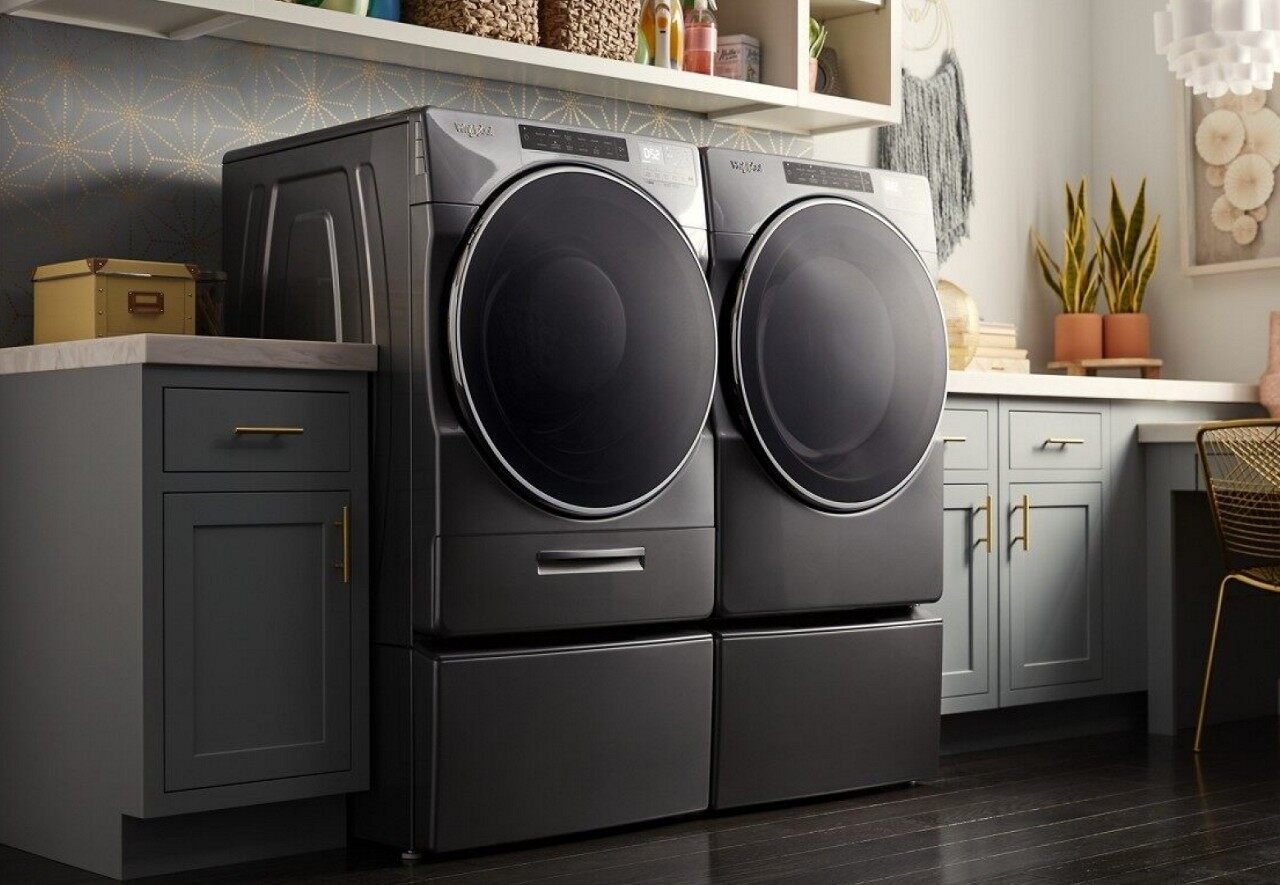
Photo Source: commission.europa
Making an informed purchase decision requires carefully comparing the energy efficiency ratings of washing machines. Here are some important things to think about:
Energy Efficiency Designations
Check washing machines for energy efficiency designations like Energy Star. These marks indicate that the appliance meets or exceeds the energy efficiency requirements set by oversight organizations. Machines with higher ratings use less energy when operating.
Energy Consumption
Compare the energy consumption data listed on the product specs or energy labeling. The washing machine is more energy-efficient the lower the energy usage. Seek for models that use significantly less energy than equivalent standard models.
Water Usage
Take into account how much water washing machines use, especially in places where water is scarce or where water is expensive. To maximize water consumption, energy-efficient devices frequently have technology like load detection or water level adjustment. Look for models that offer great cleaning performance while using less water.
Capacity and Load Size
Consider the capacity and load size that you frequently need. Larger machines could use more energy each cycle, but washing larger loads in fewer cycles might be more energy-efficient.
Extra functions
Take into account the washing machine’s additional energy-saving functions. Look for alternatives that let you take advantage of off-peak power costs, such as eco-friendly wash cycles, rapid wash programs, or delay start features.
Spin Efficiency
Efficient water extraction during the spin cycle reduces drying time, saving both energy and time. Look for washing machines with high spin speeds and good spin efficiency ratings.
User Reviews and Expert Recommendations
Look into user reviews and expert suggestions to learn more about the dependability and real energy performance of various models. Beyond the energy ratings, real-world experiences might offer insightful information.
Long-Term Cost Considerations
Energy-efficient washing machines may cost more upfront, but they can save you money in the long run by using less energy and lowering your electricity costs. Think about the possible cost reductions over the appliance’s lifetime.
You may select a model that fits your demands for laundry, budget, and energy-saving goals by comparing the energy efficiency ratings of washing machines based on these criteria. Keep in mind to strike a balance between energy economy and other crucial elements like performance, durability, and user pleasure.
Tips for Choosing an Energy-Efficient Washing Machine
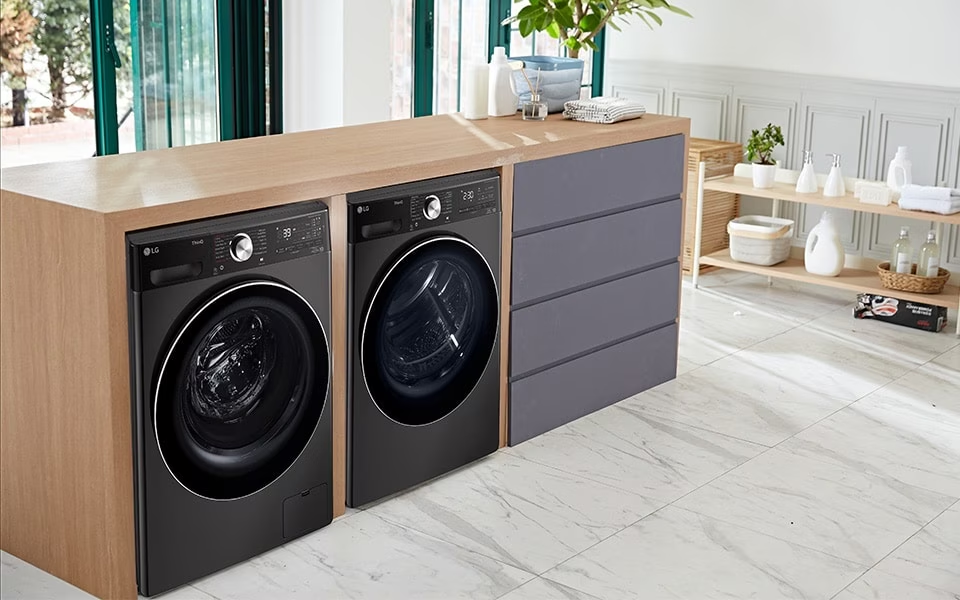
Photo Credit: uswitch
When selecting an energy-efficient washing machine, consider the following tips to make an informed decision:
Look for Energy Star certification
Choose a washing machine that bears the Energy Star label. This certification ensures that the appliance meets strict energy efficiency standards and will consume less energy compared to non-certified models.
Consider the size and capacity
Determine the appropriate size and capacity of the washing machine based on your household’s needs. Opt for a size that matches your typical laundry load to avoid wasting energy on half-empty cycles.
Compare energy consumption
Check the energy consumption information provided on the appliance’s label or specifications. Look for lower energy consumption figures, as this indicates a more energy-efficient machine.
Assess water usage
Consider the water usage of the washing machine, particularly if you reside in an area with water scarcity or high water costs. Look for models with features like load sensing or water level adjustment, which optimize water usage based on the load size.
Look for advanced features
Energy-efficient washing machines often come with advanced features that enhance efficiency. Features like variable spin speeds, quick wash options, or delayed start functions can help save energy by tailoring the wash cycle to your specific needs.
Read user reviews
Research user reviews and ratings to gain insights into the actual energy performance, reliability, and overall satisfaction with different models. This information can help you make a more informed decision based on real-world experiences.
Consider long-term cost savings
While energy-efficient washing machines may have a higher upfront cost, they can lead to long-term savings through reduced energy consumption and lower utility bills. Calculate the potential savings over the lifespan of the appliance to assess the overall cost-effectiveness.
Check for warranty and service options
Ensure the washing machine comes with a warranty that covers both parts and labor. Additionally, explore the availability of service centers and spare parts in your area to ensure proper maintenance and repairs if needed.
By following these tips, you can select an energy-efficient washing machine that not only conserves energy but also meets your specific laundry needs and budget.
Energy-Efficient Washing Machine Maintenance
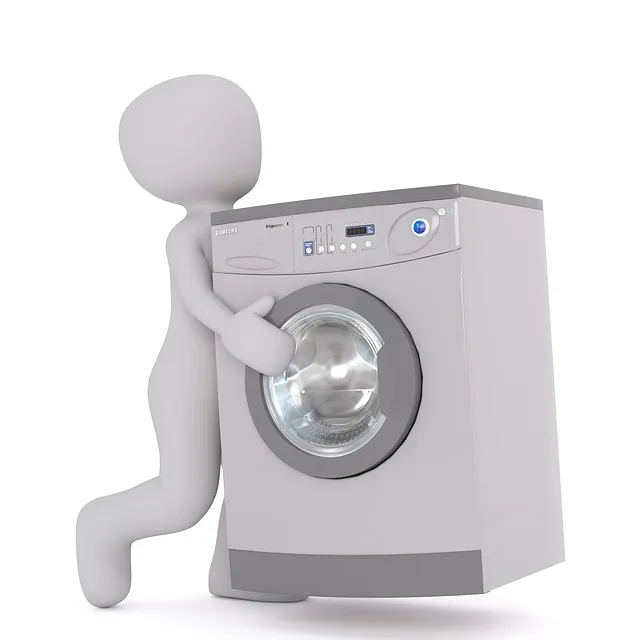
Photo Source: medium
To maintain the energy efficiency of your washing machine, follow these tips:
1. Regular Cleaning
– To get rid of any accumulation or residue, clean the detergent dispenser, lint filter, and drum often.
– Clean the machine’s exterior to keep dust and debris off of it.
2. Optimal Loading
– To maintain efficiency and prevent motor wear, avoid overloading the machine by following the load capacity recommendations provided by the manufacturer.
3. Choose Energy-Saving options
– Whenever practical, choose energy-saving options like eco-mode or cold-water wash.
– To prevent overusing water, use the proper water level setting according on the load size.
4. Maintain Proper Water flow
– For the machine to operate well, make sure there is a consistent and sufficient flow of water.
– To avoid obstructions and guarantee appropriate water flow, routinely inspect and clean the water input filters.
5. Make use of high-efficiency detergent
Choose high-efficiency (HE) detergents that are made for contemporary washing machines. These detergents use less energy since they are designed to function well in colder water.
6. Prevent Lint Buildup
– After every wash, clean the lint filter to avoid obstructions and to maintain ideal airflow, which helps the dryer dry clothing effectively.
7. Balance the Load
– Distribute the laundry evenly inside the drum to maintain proper balance during the spin cycle. Due to the machine having to work harder and spend more energy, unbalanced loads might occur.
8. Consistent Maintenance Checks include
– Examining hoses and connectors for leaks or wear indicators. Replace any broken components right away.
– To guarantee smooth and effective operation, frequently check the machine’s leveling and make adjustments as necessary.
9. Avoid Excessive Detergent
– Follow the recommended detergent dosage guidelines to prevent excessive suds that can impede the machine’s performance and require additional rinse cycles.
10. Professional Servicing
– Schedule periodic professional servicing to inspect and maintain the internal components of the washing machine, ensuring optimal energy efficiency and performance.
You can maximize energy savings and maintain your energy-efficient washing machine’s performance according to these maintenance procedures.
Environmental Impact of Energy-Efficient Washing Machines
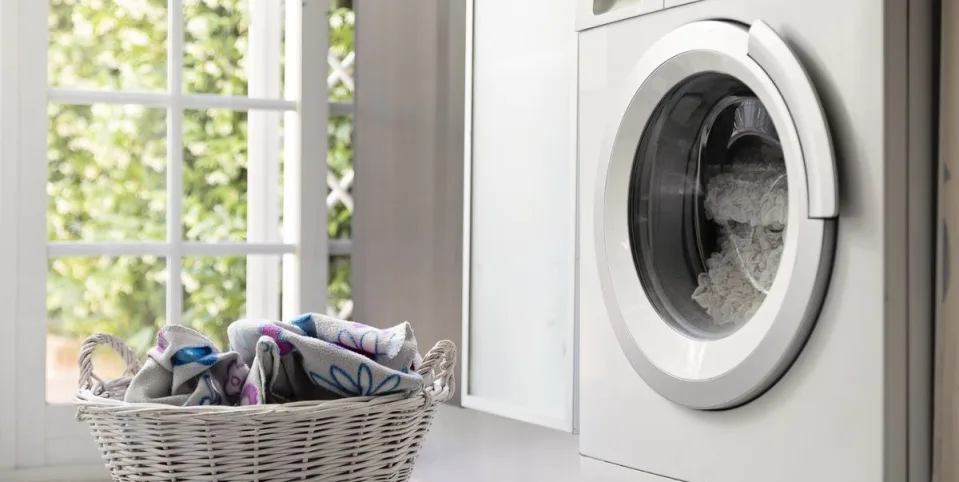
Photo Credit: yahoo
Due to a number of factors, energy-efficient washing machines have a favorable environmental impact.
1. Reduced Energy Consumption
Compared to standard models, energy-efficient washing machines are built to use less power. They assist in lowering greenhouse gas emissions linked to power generation by using less energy while operating. This lessens the negative environmental effects of energy generation and fights climate change.
2. Water Conservation
Numerous water-saving washing machines are also made to consume less water throughout each cycle. They use innovations like load sensing, which modifies water levels according to the weight of the load. These devices assist save water resources by maximizing water use, which is crucial in areas where there is a shortage of water.
3. Smaller Carbon Footprint
Over the course of their lifetime, energy-efficient washing machines leave a smaller carbon footprint thanks to their lower energy usage. Compared to less efficient versions, these machines have a less environmental impact at all phases of production, transportation, and usage.
4. Waste Reduction
Energy-efficient washing machines frequently have functions that improve garment care and reduce fabric damage. By extending the life of clothing, less frequent replacements are required, and eventually, less textile waste is produced. Some models also have cutting-edge technology that enable more effective detergent usage, reducing waste in the washing process.
5. Energy Labels and Standards
In order to qualify for certification labels like Energy Star, energy-efficient washing machines must pass stringent testing and adhere to a set of energy efficiency requirements. With the help of these labels, customers may make informed decisions and support sustainable practises by having access to clear information regarding the environmental performance of the appliance.
6. Consumer Attitude and Behaviour
The advertising of energy-efficient products like washing machines aids in increasing consumer understanding of energy efficiency and environmental effect. Individuals actively support sustainability and lower energy consumption by selecting energy-efficient models.
7. Government Policies
To promote the use of energy-efficient equipment, such as washing machines, many governments and utility companies provide incentives, rebates, or tax credits. These programs provide customer access to energy-efficient solutions while promoting the usage of environmentally friendly technologies.
Customers may lessen their environmental impact by buying energy-efficient washing machines, which also encourage sustainable consumption habits and energy conservation. These devices are essential for solving environmental issues and advancing toward a future that is more sustainable.
Addressing Common Concerns and Misconceptions

Photo Source: butterflygroupbd
Addressing Common Concerns and Misconceptions about Energy-Efficient Washing Machines
1. Price
The higher cost of energy-efficient washing machines compared to their less efficient counterparts is a prevalent worry. Energy-efficient models may cost more upfront, but it’s crucial to take the long-term reduction in energy costs into account. These devices’ lower energy use can eventually result in large savings, making up for the original expenditure.
2. Cleaning Performance
Some consumers worry that washing machines that use less energy may not perform as well when it comes to cleaning. However, technological developments have made it such that energy-efficient versions have outstanding cleaning outcomes. In order to accommodate various fabric kinds and levels of dirtiness, look for washing machines with a variety of wash settings and cycles.
3. Cycle Length
Another myth is that machines that use less energy have longer cycle periods. Many contemporary energy-efficient machines provide rapid wash choices that produce effective cleaning in less time, despite the fact that some energy-saving features, like as low-temperature wash cycles, may take a little longer. Additionally, any little variations in wash periods may be compensated for during the spin cycle, which is shortened as a result of effective water extraction.
4. Limited possibilities
A number of buyers are under the impression that energy-efficient washing machines offer few features and customization possibilities. Instead, producers are aggressively integrating cutting-edge technologies into models that are energy-efficient. You should look for features like delay starting, adjustable settings, and smart networking in these devices.
5. Upkeep and Repairs
It’s a myth that energy-efficient washing machines need more upkeep or need repairs more frequently. Like any equipment, the machine needs routine maintenance to stay in good working order. Following the manufacturer’s maintenance instructions and taking care of problems as soon as they arise will assist guarantee optimum performance and lifetime.
6. Compatibility
A variety of laundry detergents are compatible with energy-efficient washing machines. To get the best results, it is advised to use high-efficiency (HE) detergents designed especially for these machines. HE detergents can assist keep the machine operating efficiently because they are made to function well with less water.
7. Availability
In some areas, there may be questions regarding where to find energy-efficient washing machines. The demand for energy-efficient appliances is rising, though, and manufacturers are expanding the availability of these devices in response to worldwide environmental measures. Look online and at nearby merchants for a selection of energy-efficient solutions.
By addressing these worries and misunderstandings, customers will be better equipped to choose energy-efficient washing machines. Consumers may purchase cost- and environmentally-conscious appliances with confidence if they are aware of the advantages, performance potential, and long-term savings linked to these devices.
Final Thoughts
Washing machines that are energy-efficient are essential for encouraging sustainability, protecting resources, and lessening environmental effects. These devices provide a wide range of advantages thanks to their cutting-edge technology, water-saving features, and optimized energy usage.
They not only reduce energy use and utility costs, but they also help conserve water and cut back on carbon emissions.
You may make an informed choice that supports your sustainability objectives by adhering to the advice for picking, caring for, and comprehending the environmental impact of energy-efficient washing machines.
Frequently Asked Questions (FAQs)
1. What is the average cost of an energy-efficient washing machine?
Depending on the brand, model, and features, an energy-efficient washing machine’s typical cost might change. Generally speaking, compared to traditional machines, energy-efficient versions cost more upfront.
However, the long-term cost reductions from reduced energy and water use make them an investment worth making.
2. Are energy-efficient washing machines suitable for large families?
Yes, washing machines that are energy-efficient are appropriate for large families. They are available in a variety of capacities to handle varying load sizes.
It’s important to choose a machine whose capacity corresponds to the washing requirements of your household. Energy-efficient versions may successfully meet the laundry demands of big families if the proper size is chosen and the machine is used in an appropriate manner.
3. Can energy-efficient washing machines clean heavily soiled clothes?
Yes, very filthy clothing may be successfully cleaned in energy-efficient washing machines. These washers include cutting-edge washing technologies and configurable cycle choices that let you change settings based on how dirty the load is.
The cleaning effectiveness of energy-efficient washing machines may also be improved by using premium detergents and pretreating stains.
4. Are energy-efficient washing machines more expensive to repair?
Depending on the individual problem and the warranty coverage, the price of repairs for energy-efficient washing machines can change.
Consider long-term cost savings in energy and water usage, despite energy-efficient models possibly having advanced features that may raise repair costs.
The lifespan of your equipment can be increased and the need for repairs reduced with regular maintenance and good use.
5. How do I properly dispose of an old washing machine?
To have as little of an environmental impact as possible, outdated washing machines must be properly disposed of. To learn more about their disposal policies for appliances, get in touch with your neighborhood recycling or trash management facility.
For washing machines, some facilities may provide recycling services, ensuring that the contents are handled and recycled appropriately. Additionally, programs for recycling or appliance take-back campaigns may be in place with manufacturers or merchants. Follow the suggested procedures to dispose of your old washing machine properly.
